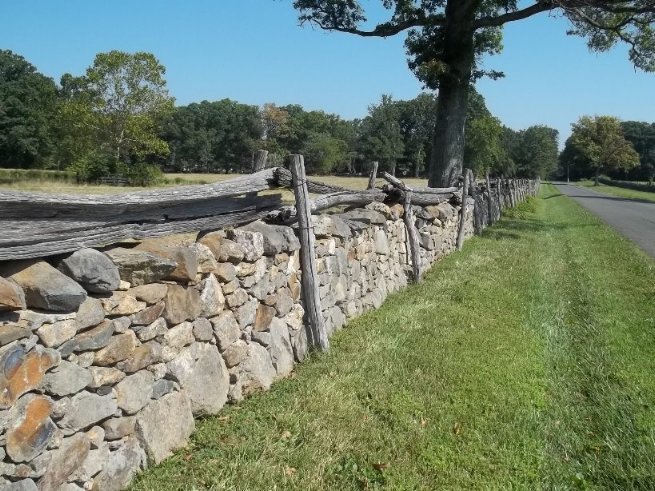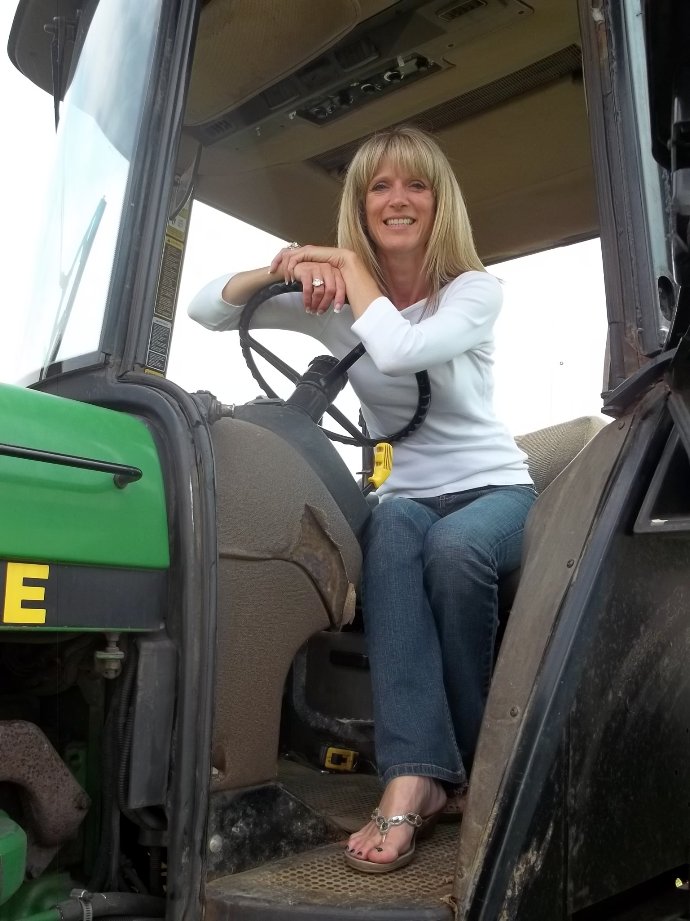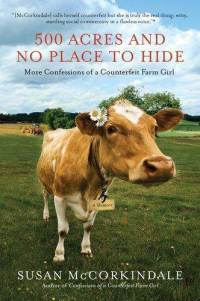|
The Counterfeit Farm Girl by Bill Glose Portions originally published in Virginia Living Magazine
I�d been hiking this stretch of road on my own for the past week, but today Dawn joined me. We began the walk around midday when the temperature was warm and our spirits high. As we reached the town limits of Upperville, the endless line of three-rail, wooden fence bordering the road was replaced with waist-high stone walls. They were several feet wide at the base and tapered off to a foot at the top. The stones weren�t evenly cut and slapped together with mortar like a brick wall; the stones were loose and interwoven, resembling the walls that stitched the hills of Ireland. The rock walls lined both sides of the road and stretched as far as I could see. I was daydreaming as I walked, imagining how difficult it must have been to construct a six-foot segment, let alone this endless expanse, when Dawn slugged me in the shoulder. �That�s the place, right?� Sure enough, we�d reached the dirt driveway leading up to Sue McCorkindale�s 500-acre farm. She�d formerly been the marketing director in New York City for Family Circle magazine, but when her husband Stu begged her to try life on a farm, she left the Big Apple behind. Shell-shocked by the culture difference, she wrote about her experiences in two hilarious memoirs: Confessions of a Counterfeit Farm Girl and 500 Acres and No Place to Hide. Ever since I�d read about her misadventures�chickens attacking her, goats straying into the house, dogs bringing calf skulls as presents�I�d been eager to meet her.
Her brash Jersey accent was as out-of-place in the country as were the ever-present high heels on her feet. Although she owned work boots, she only wore them for tasks that would be utterly ridiculous wearing anything else. If it was only slightly ridiculous, like taking us on a tour of her farm, then she wore heels. I asked about the heels as we followed her around the side of the house toward the pasture. �One of first times I had to help with the cows,� she said, �it was spur of the moment and I was wearing high heels. Stu started hollering at me from outside that he needed my help. And I came out and he�s trying to corral them. And I�m doing this.� She parodied moving side to side with arms outstretched like a basketball player guarding an opponent. Then she flapped a hand at us. �I�m always improperly dressed. If I had sneakers on, Stu would be like, �You�re either going out jogging or you don�t feel well.� It just got to be funny after a while.� �What kind of heel troubles have you had?� �Broken shoes, the heel straps, the buckles pop off. Eventually what I figured out is you don�t wear the really good shoes during the day like you used to, Susan, you dum-dum. You save those for a special occasion. You wear the cheapies around the farm. You go to Pay Less and you get them there. And if they last three weeks or three months or a season or whatever, you�re a happy camper.� Sue opened a gate and led us into a field occupied by a herd of Black Angus, which belonged to a cattleman who leased grazing rights from her. She stepped cautiously around the patties, but otherwise plugged along. �Are these the cows you decorated with Christmas lights?� I asked. �We actually didn�t do it this past Christmas. They�re pins, you know, those flashing pins you put on your shirts. We put them on Cuyler�s cattle, but we didn�t put them on Bill�s because we didn�t really think we should. They were just clip-ons, and they have ear tags so it was easy enough to do. One time, when we had the baby bulls, I got a couple of those big dog collars�big pink ones�and I put them on the baby bulls. Even out here, there�s no reason not to dress up.� As we tromped through the thick field of green, all was quiet except for the squishing sound of our steps. �It�s rejuvenating out here,� Dawn said. �Serene.�
�So why leave New York?� Dawn asked. �It was too much to deal with after 9/11. I mean, a truck backfires and everybody jumps out of their heels. We were scared every single day. And there were these National Guardsmen in the big white suits because of the anthrax scares. Stu and I talked about getting out of Dodge and going somewhere else. I just figured it would be somewhere with people. And a Starbucks. And a shoe store would be nice!� Coming out of the pasture, Sue pointed out the metal grating in the ground and told us how cows wouldn�t walk on it. Usually. �One time, there was so much snow that the cattle guard filled up to the top. Then it froze over and the cows walked straight over the top. We all went out there, including Stu, poor guy. He was so sick. He got up and was like, �I�m coming to help.� And we were all out there trying to shove the cows back in. Eventually what we did, we parked the pickup truck there to block the opening.� Her husband had passed away after a painful battle with cancer. In her second book, Sue poignantly reflected on his illness. �I�m very sorry about Stu,� I said. �He sounded like someone I would have liked to know.� �Yeah, he was a great guy. Stu loved being a farmer. He was good at it. The animals loved him. They came looking for him when he was sick. He could walk out there like Jesus being swamped by the crowds. He would have his bucket of ranch cubes and they would be on him, nudging him. It was very cool.� �So did your neighbors help out after Stu was diagnosed?� �Oh, sure. One day, when he was first sick, I went out and there was this gigantic man walking toward me up Quadrangle Road holding two goats, one under each arm. We had three goats. �Ma�am, these your goats?� �Why, yes, yes they are.� He was so sweet. Because I started to cry and I told him what�s going on. And he was like, �Ma�am, we�re going to put you on our church�s prayer list.�� After touring the barn, the henhouse, and the vegetable garden, we finished up in her house at a round, wooden table just off the kitchen. Her fat, gold cat rubbed against my legs and her golden retriever plopped his head in my lap. As I scratched behind his ears, I asked Sue, �How have you adjusted to farm life now that you�re the one wearing the big hat?� �It no longer paralyzes me. We ran back and forth to hospital for twenty-one months and I had all that time to pick Stu�s brain, all that time for him to show me what to do. My mom worried, of course. I told her, �I have locks on the doors, I have my big bat, and I have dogs that will lick any intruders to death.�� And that statement illustrated Sue�s rosy outlook as well as anything. She still felt out of her element on many days, but she never let it get her down. She would keep her sense of humor as she took care of the land, shooed goats from the house, and herded cows from the street back to the pasture. And she would do it all while wearing high heels. |


